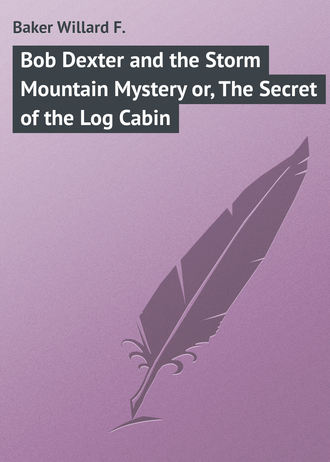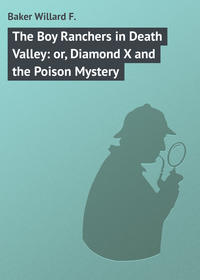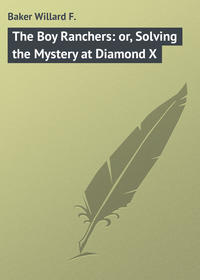
Bob Dexter and the Storm Mountain Mystery or, The Secret of the Log Cabin
“Where’s the land?” asked Bob. “I didn’t know we had any in Cliffside that was suitable for monkey business,” and he laughed.
“Why, this Pietro Margolis said he had been looking at land around here, and he found a piece that just suited him. It’s that overgrown bramble patch back of the house where Hank Denby lived at the time of his death.”
“You mean some of Mr. Denby’s land?”
“Yes, Bob. I’ve practically rented this Italian, for a year, that bramble patch, and I consider, as executor of the estate of the old man, that I got a good price for it. You know it’s the duty of an executor, Bob, to Increase the estate if possible. And though I don’t imagine the nieces and nephews of Hank – for those are all the relatives he left – I don’t imagine they appreciate what I’ve done, still it was my duty.”
“Yes,” agreed Bob. “So he left his estate to nieces and nephews, did he? But what about the pirate fortune that went to Hiram Beegle – that is if Hiram ever gets it – what about that? Won’t these nieces and nephews want a part of that?”
“It wouldn’t do them any good to want it, Bob,” stated the lawyer. “You see that gold, or whatever form the wealth was in that was dug up on the island – that fortune was held by Hank in trust, so to speak. At his death it went to the survivors of the original four – or such of them as had played fair and kept the agreement Hiram Beegle was the only one, so he got all the others’ shares.”
“That is he has them to get,” remarked Bob, somewhat grimly. For the stealing of the brass-bound box, containing the directions for finding the hidden wealth, had effectually blocked Mr. Beegle’s chances.
“Yes, it’s very much in distant prospect, Bob. But perhaps you’ll be able to help the old man.”
“Maybe. I don’t suppose Hank ever intimated to you where he had buried the stuff?”
“Never a word, Bob. He was as close as an oyster on that point, though he told me everything else about his affairs. He said Hiram would have no trouble locating the gold if he followed directions on the map in the brass-bound box. It was very peculiar on the part of Hank to bury the fortune this way, instead of keeping it in a bank vault, but it was his business, not mine, and though I did my best to persuade him to use business methods, it was of no use. He clung to his old sailor superstitions.”
“Yes,” agreed Bob, “and Hiram and Jolly Bill Hickey are much the same. I suppose you know Jolly Bill is staying at the Mansion House?”
“So I heard, yes. Well, I think I’ll go up and look over this piece of old Hank’s land this monkey merchant wants to rent to raise food for his nimble charge. I want to see that he has no ulterior motive, so to speak.”
“What do you mean?” asked Bob, a bit puzzled.
“Well, he may know of some land development out in that neighborhood – something like a railroad going through or a new trolley line. If he had a lease on some property that was needed, he might hold up matters until we paid him a big price.”
“Oh, I see,” remarked Bob. “These Italians are sharp and tricky when it comes to matters of property, I’ve heard.”
“That’s right, Bob. This fellow may be all right, but I owe it to the estate not to take any chances. So I’ll take a look over the ground before I sign the lease.”
“I’ll run you up there, if you’re going now,” offered Bob. “That is if you don’t mind riding in my flivver.”
“I’ve ridden in many a worse car. Bob. And I was on my way to look over old Hank’s property. Come on, we’ll go together.”
Judge Weston had truly spoken of the vacant lot near the Denby house as a “bramble patch.” It was just that and nothing more. Nor were there any signs in the neighborhood of any real estate boom. It was far off the line of the railroad, and not near the trolley.
“I guess there’s no harm in letting Pietro have this place on a lease,” said the judge, when he had gone around the bramble patch. Going over or through it was out of the question.
“It doesn’t seem to be good even for monkey food,” laughed Bob.
“No, I should say not. But then we don’t know what monkeys like. I’ll go back and draw up the papers.”
Bob drove the lawyer back to his office, and as they parted Mr. Weston said:
“If you get any trace of this Rod Marbury, Bob, or get a line on where Hiram can find the missing map, let me know, will you?”
“I will,” promised the lad.
“I feel a friendly interest in Hiram,” went on the lawyer, “and I’d like to see him get what’s coming to him.”
“I’m going to help him all I can,” declared the young detective.
It was several days after this, during which time Bob had worked in vain to get a clew to the mysterious happenings at the log cabin on Storm Mountain that, one evening, on his way home in his car, having done an errand for his uncle, he passed the old house where Hank Denby had died.
In the glow of the setting sun Bob saw some one moving about in the field behind the house – the field which Judge Weston had rented to Pietro Margolis as a garden in which to raise monkey food.
“It’s the Italian organ grinder himself!” exclaimed Bob as he caught sight of the black-bearded fellow.
Bob stopped his flivver, and the noise of the squeaking brakes caused the Italian to look up. He saw and must have recognized the lad. But if he was at all disturbed at being observed he did not show it. Instead he smiled, showing his white, even teeth.
“Hallo!” greeted Pietro. “Hallo-hallo!” He had a queer pronunciation of it – not unpleasant, though.
“Hello,” replied Bob. “You grow monkeys here?” he jokingly asked.
“No – not maka da monk grow – maka him eats grow.”
“You mean peanuts?” asked Bob, though he knew it couldn’t be goobers, or ground-nuts, that Pietro contemplated raising in the bramble patch. The lad was throwing out feelers, so to speak.
“No peanuts!” laughed the Italian. “Look – monkey lika deese!”
He held out in his hand, having taken them from the pocket of his coat – some sort of dried fruit or nuts, Bob couldn’t decide which.
“Oh, you’re going to plant these, eh, Pietro?”
“Sure – plant for da monk.”
“But they won’t grow this time of year, Pietro. Cold weather, you know – Jack Frost kill ’em. Look, everything now almost dead,” and Bob waved his hand over the sear and yellow weeds in the bramble patch.
“Oh, sure, I know – cold – not plant now – plant by next summer time. Just dig now – maka da holes.”
“Holes!” exclaimed Bob.
And then he became aware of some curious digging operations that the Italian had been carrying on. There were a number of deep holes here and there in the bramble patch – holes newly dug.
CHAPTER XIV
A NIGHT PURSUIT
Smilingly, Pietro Margolis leaned on his spade and regarded Bob Dexter. The Italian had been using a spade to good advantage in the bramble patch of old Hank Denby.
“You plant these monkey nuts very deep, don’t you?” asked Bob, calling the objects the Italian had shown him “nuts,” though he was not certain on this point.
“Sure – got to be deep,” said the organ grinder, though he had temporarily abandoned that occupation it seemed. “No deep – no grow.”
He tossed into the last hole he had dug a few of the dried objects from his coat pocket, shoveled in the earth and tramped it down.
Bob Dexter knew, or thought he knew, something of farming.
“You’ll never make anything grow planting it as deep as that and then stamping the ground down as hard as a brick!” declared the lad.
“Oh, sure da monkey nuts grow!” declared the Italian with a smile. “Alla same we plant dem lika deese in Italy.”
He smiled his white-tooth smile.
“Oh, in Italy,” conceded Bob. He couldn’t dispute this. He had never been in Italy and knew nothing of these strange fruits or nuts.
“Sure – Italy. Deese grow fine when da warm weather he come back. Put ’em in deep so no freeze.”
There might be something in that theory Bob admitted to himself. Idly he watched the Italian dig. He cut aside, with wide sweeps of the sharp spade, the dead and dying weeds and brambles, and when he had a cleared place he began on another hole, not far from where he had dug several others, as evidenced by the mounds of fresh earth.
“How’s the monkey?” asked Bob, seeing no object in lingering longer on the scene.
“Jacko – he good – I leave him by friend while I plant hees food for da next year.”
“What does he live on while these things are growing – there won’t be any until next year,” said the young detective.
“I got some I breeng from Italy – ’nough, mebby, to last. I dunno! Jacko eat da banana too, mebby.”
“Um,” mused Bob. “Well, I wish you luck, but I don’t think much of your farm,” and he laughed as he started away.
“Sure, I have da good luck – t’anks,” and the Italian smiled and waved a hand in farewell. Then he resumed his digging.
Bob Dexter was doing some hard thinking as he drove his little flivver down the road and away from the bramble patch, where he left the Italian digging away at the holes, into which he dropped those queer, dried nuts or fruits. And Bob was still thinking on the many problems caused by the robbery and assault on Hiram Beegle as he went to his uncle’s store and reported on the business matter that had taken him out of town.
The young detective was still puzzling away over the many queer angles to the case when he reached home, and in the twilight he rather started nervously as he heard his name called when he was putting the car in the garage.
“Hello, Bob!” some one hailed him.
“Who’s that?”
“What’s the matter?” laughed the voice of Harry Pierce. “Any one would think I was a detective after you.”
“Oh – yes, I was thinking of something else,” admitted Bob with a laugh. “Come on in! Seen anything of Ned?”
“I’m here,” replied the other chum, as he stepped out of the darkness. “Where you been?”
“Over to the courthouse for Uncle Joel. Anything happened in town while I was away?”
“Nothing much. Say, what you going to do to-morrow?”
“Same answer, Harry – nothing much.”
“Then let’s go after chestnuts.”
“Chestnuts! There aren’t any left!” declared Bob. “The blight has killed them all.”
“Not all,” declared Ned. “I know a grove on Storm Mountain where there are still a few good trees left. I found it by accident this summer. I’ve been saving it.”
“Good enough!” cried Bob. “I’m with you. Chestnuts are great, but I didn’t think there were any left. Sure I’ll go.”
“All right – Harry and I’ll stop for you early in the morning. There’s likely to be a hard frost to-night and that will open the burrs,” spoke Ned.
Bob thought of the frost and the holes the Italian was digging to plant his monkey nuts. But the holes seemed to be below the effect of anything but a hard and deep frost, and that kind didn’t come so early in the season.
“I’ll be ready,” promised the young detective, “Is the chestnut grove anywhere near Hiram Beegle’s log cabin?”
“Not so far away – why?” asked Harry.
“Oh, I thought I might want to stop over and see the old man – just to see if there’s anything new in the case.”
“Sure, we can do that,” agreed Ned.
“How you coming on with the case?” Harry wanted to know.
“I’m not coming on at all, fellows. It’s at a dead standstill, as far as I’m concerned.”
“Oh, well, you’ll pop off with something unexpectedly, like you did when you discovered the wireless station that was putting out the lighthouse beacon,” said Harry.
“Maybe – I hope so,” sighed Bob.
His chums called for him next morning before he had finished his breakfast. But Bob hurried through the meal, found an old sack to hold the chestnuts he hoped to gather, and soon the three chums were chugging in the flivver up the trail of Storm Mountain.
The day was pleasant, with just the tang of winter in the air, for Ned’s prediction of a heavy frost had been borne out and there was every prospect of a good fall of the sweet, brown nuts.
“If the squirrels and chipmunks haven’t been there ahead of us,” remarked Harry as they talked over the possibilities.
“Or that dago’s monkey!” added Ned. “Say, what do you know about that fellow, anyhow? He’s still hanging around town. Lives at the Railroad House and goes out with his organ every night. Charlie McGill was telling me he takes in a lot of nickels, too, playing down around the post office. His monkey does a lot of tricks.”
“So I’ve heard,” admitted Bob. But he did not tell of what he had seen in the bramble patch.
“But I guess he won’t be up here with his monkey,” stated Ned.
“Do monkeys eat chestnuts?” asked Harry.
“Sure they do!” declared Bob. “Don’t you remember the story we used to read in school, of the monkey who hired a cat to pull the roasted chestnuts out of the fire?”
“Oh – that’s moving picture stuff!” laughed Ned.
Talking and joking they wended their way up Storm Mountain. They passed the cabin of Hiram Beegle, but saw no signs of life about it, and, as it was rather early, Bob thought it best not to stop then to speak to the old sailor.
“We’ll give him a hail on our way back,” he decided, the others agreeing to this.
Ned’s promise to lead his chums to a grove of chestnut trees not killed by the blight which swept over this country a few years ago, was carried out. And, parking the car in a quiet lane, the boys were soon gathering a goodly supply of the new, brown nuts.
The lads were not alone in their garnering, for the grove was a scene of activity on the part of squirrels and chipmunks who took this opportunity of laying up their winter’s store of food. But there were enough chestnuts for all, and having filled the bags they had brought with them, the boys began to think of returning.
The sun was higher and warmer when they passed the log cabin again, and Hiram Beegle was pulling weeds from between his rows of dahlias, for he had a small but beautiful garden of these large and showy flowers.
“Hello, boys!” greeted the old sailor heartily, for he was by this time fully recovered from the effects of the strange attack made on him at the time of the robbery of the treasure map.
“Hello!” greeted Bob, Ned and Harry.
“Come on in,” invited the old man. “I can give you some cookies and milk.”
“That sounds good to me!” declared Ned.
His long years of sailor life had fitted Hiram Beegle to keep house by himself, and, not only do that but cook well – an art to which his three visitors soon bore testimony. For not only did he set out a plate of excellent molasses cookies before them, but some sandwiches and pie, all of which he had made himself.
The boys had eaten an early breakfast, and chest-nutting, or, indeed, any excursion in the open, creates a good appetite, of which our heroes had no lack. So they did full justice to the little lunch the old seaman prepared for them.
“I don’t s’pose you’ve heard anything about your missing box, or about Rod Marbury, have you?” asked Bob when a lull came in the eating.
“Nary a word. I’ve kept pretty close to my cabin. I didn’t want that scoundrel attacking me again.”
“Oh, he won’t come around again,” said Harry.
“I guess not. He got what he was after,” remarked Ned.
“While we’re here,” proceeded Bob, “I’d like to have another look at this room, Mr. Beegle. It seems as if there must be some way of getting a key in through the wall.”
“Well, Bob, look as much as you like, but you won’t find even a crack. I took good care of that. The chimney hole is the only opening, and you proved that couldn’t have been used.”
In spite of the assertion of the old sailor, Bob went carefully over each foot of the partition wall, aided by Ned and Harry. The strong room was built across one end of the log cabin, in the end. The three outer sides were of solid logs, chinked and sealed with real mortar, not mud as is sometimes used. There was no break in this. The chimney was built at the rear, and on the outside. It was made of field stone, both attractive in appearance and strong. There were no chinks or cracks through which the key might have been tossed.
The inside wall was of a double thickness of narrow wooden boards, and Bob thought there might be some secret panel in this, as there was a concealed slide hiding the niche where the brass key was kept.
But a careful examination showed no opening, and Hiram declared there was no secret panel.
“What I was thinking of,” said Bob, “was that the thief, using a very fine saw, might have sawed out a piece and have fitted the piece back again, after throwing the key inside.”
But the boards were so closely fitted and as solidly nailed to the partition uprights as when Hiram had the work done, some years before.
“Well, I guess I’ll have to give it up,” remarked Bob in disappointed and baffled tones at the conclusion of the examination. “It’s a deep mystery,” The lads thanked the old sailor for his hospitality and rode on back to Cliffside, bearing with them a goodly supply of chestnuts which they divided among their friends.
It was after supper that evening when Bob was settling down to read a book that the telephone in his uncle’s house rang a summons. Mr. Dexter answered it and, after listening a moment, said:
“It’s you they want, Bob. Chief of Police Duncan!”
“The chief!” exclaimed the lad, his heart suddenly beating fast. “I wonder if he’s found out anything?”
He greeted the officer.
“Say, Bob,” came the eager voice, “I think we’re on the trail of that fellow who robbed Hiram!”
“You mean Rod Marbury?”
“Yes. I just got a tip that there’s a strange sailor over in Cardiff, spending money freely. I’m going over and have a look at him. Would you like to come along? You heard Hiram describe this chap – you might know him. Want to come?”
“Sure I do! Wait a minute!”
Bob quickly explained to his uncle the nature of the summons.
“You mean chase off in the night after this suspect?” asked Mr. Dexter, not at all pleased.
“Yes. The chief wants to catch him. May I go?”
“Oh, I suppose so, Bob. But be careful!” The consent was reluctantly given.
“I will, Uncle Joel.”
“Oh, Bob, I hate to have you go out at night on this detective business!” objected Aunt Hannah.
“You’ve got to do night work if you’re going to be a detective,” said Bob cheerfully. He was even elated at the prospect before him of a night pursuit.
Quickly he made ready and soon he was chugging in his flivver down to police headquarters.
CHAPTER XV
A SINGER IN THE DARK
“This tip just came in,” explained Chief Duncan when Bob had joined him, a little excited by the news and by his quick trip from home. “I thought I’d rather have you with me chasing it down, than to take Caleb or even Sam Drayton.”
“Glad you thought of me,” murmured Bob. Caleb Tarton was the chief constable of Cliffside, while Mr. Drayton, of course, was the chief of Storm Mountain.
“Yes,” went on Mr. Duncan as he got into Bob’s car, for it had been decided to use that. “Of course this may be only a wild goose chase, but often you can catch chickens when you’re after geese. And, speaking of chickens, that’s the sort of case Caleb is on now. That’s another reason I couldn’t bring him.”
“A chicken case?” murmured Bob.
“Yes, seems that Tume Mellick has been missing a lot of his fowls lately, and he asked us to investigate. So I sent Caleb over.”
“Hope he finds the thief,” said Bob.
“Yes. Well, he’ll get a chicken supper out of it, anyhow. Tume always serves chicken to his company. But now about this case, Bob. Do you think you would know this fellow Rod Marbury if you were to see him?”
“It’s hard to say. I’ve never laid eyes on him, as far as I know. All I have to go by is the description Hiram gives.”
“Yes, that’s all I have. I wrote it down but I remember it. A short, stout fellow, with dark hair and a long scar on one cheek that he got in a fight.”
“That’s the description I remember,” stated Bob. “But of course if this fellow didn’t want to be discovered he could disguise himself.”
“Oh, sure,” agreed the Cliffside chief. “But they can’t hide all the marks. And when you take into consideration the fact that this suspect is a sailor, and bound to act like one, that may give him away.”
“There’s something in that,” admitted the lad. “How did you hear about him?”
“Oh, Hank Miller just got back from Cardiff – went over to sell a load of apples to the cider mill, and I’ve got my suspicions of that cider mill; by the way, I think they make a whole lot stronger cider than the law allows. But that’s for the Cardiff police to look after – ’tisn’t in my territory. Anyhow, Hank was telling me about a fellow he saw in town, spending money pretty freely, and boasting that he could get a lot more when that was gone. He acted like a sailor, so Hank said, and right away it occurred to me it might be this Rod.”
“Yes, it might be,” assented Bob. “But it doesn’t seem likely, that if this is Rod Marbury, he’d stay around here and spend the money so close to the place where he robbed Hiram Beegle.”
“You can’t always tell by that,” declared the chief wisely. “I’ve known many a criminal to keep out of the hands of the detectives a long time just by staying right near the spot where the crime was committed. He figured out they’d never look for him there, and they didn’t. They went to all sorts of other places and never thought of looking or inquiring near home.”
“Yes, I’ve heard of such cases,” admitted Bob. “I suppose it would be a good plan for a robber to live next door to the place he robbed – or very near it – for no one would think he had the nerve to do that.”
“There’s a whole lot to that!” declared the chief.
It was a dark night, and a storm was coming up, but this did not daunt the old chief nor the young detective. They made as good time as was possible to Cardiff and then there confronted them the problem of finding the suspect.
Hank Miller had said the fellow whom he supposed might be Rod Marbury had been seen in many places in Cardiff, spending his money freely and foolishly. Of course the Cardiff police might have knowledge of such an individual. He could hardly escape notice. But neither Bob nor Chief Duncan wanted to disclose their hand In this matter. That is they wanted to make the capture alone, if capture there was to be made.
“I tell you what we can do,” said the chief, as they passed slowly into the town. “We can park the car and shift about a bit on foot. We’ll learn more that way. And we can drop into some of these pool parlors where Hank said he saw this fellow.”
“Yes, we can do that,” agreed Bob.
It was not a very pleasant way to spend an evening, particularly as it was now beginning to drizzle, and was cold, too. But Bob and the chief grimly resolved to go through with it.
“I don’t much care for any of the Cardiff police to see me,” remarked Mr. Duncan as Bob parked the flivver. “Not that they’re any great shakes at picking out folks, but one of them might spot me and it would make talk. So I’ll just pull my hat down over my eyes and turn up my coat collar – the rain will be a good excuse, anyhow.”
“Good idea,” declared Bob, and a little later hardly any of their friends would have recognized the two had they seen them slouching through the streets of Cardiff – the place was rather more of a city than was Cliffside.
Chief Duncan knew the less inviting parts of Cardiff – the haunts which would, most likely, prove attractive to those who liked their pleasures strong, or who had reason to keep out of the ken of the police. So it was to not very respectable pool rooms and cigar stores that Bob was led. However, he steeled himself against the sights he saw and went through with it.
All sorts and conditions of men were met with – young men, old men and middle-aged men – far too many young men, be it said, who seemed to have nothing better to do this evening than to hang around a pool table, a flopping cigarette dangling from their lips as they squinted down the length of a cue.
The places were blue with smoke – vile tobacco it was, too – but those moving about in the blue, acrid haze seemed to like it. However, it wasn’t very good for complexions. Most of the faces were a pasty white in hue.
There were many men, it seemed, who might be wanted for one criminal charge or other, but not one of them seemed to be a free spender. In fact, few of those in the pool rooms and cigar stores appeared to have any more money than they actually needed. They were a poor lot.






